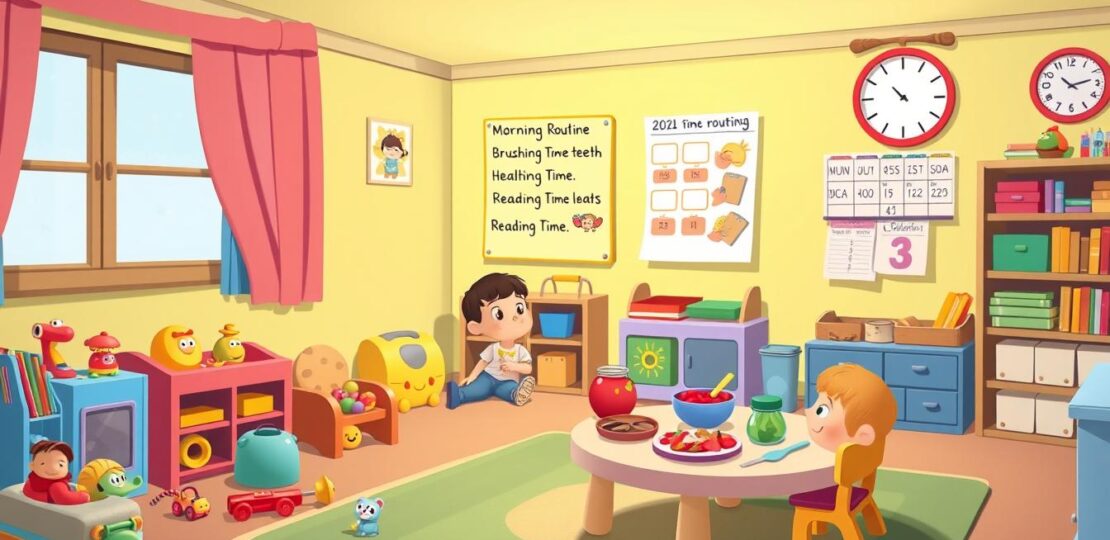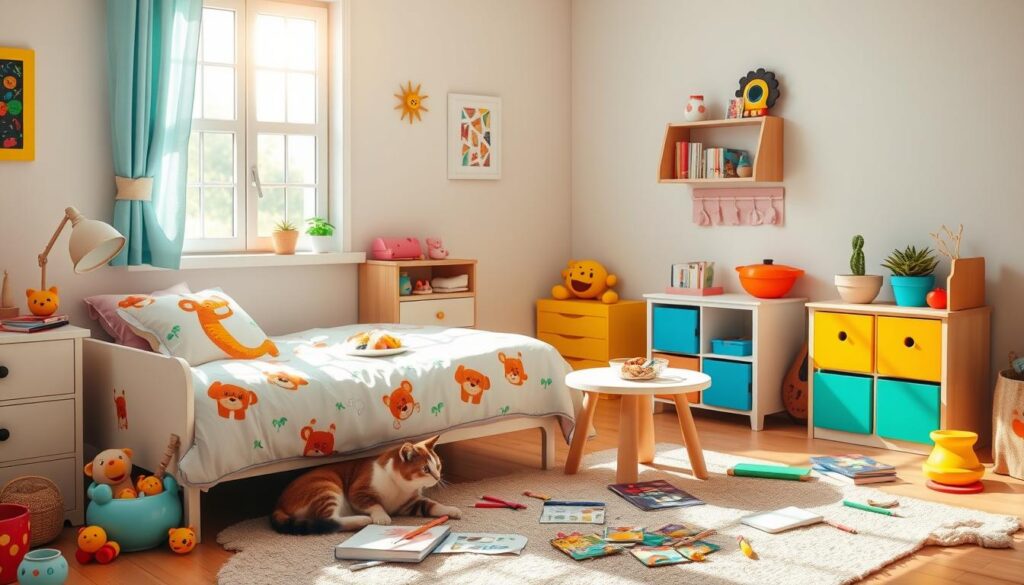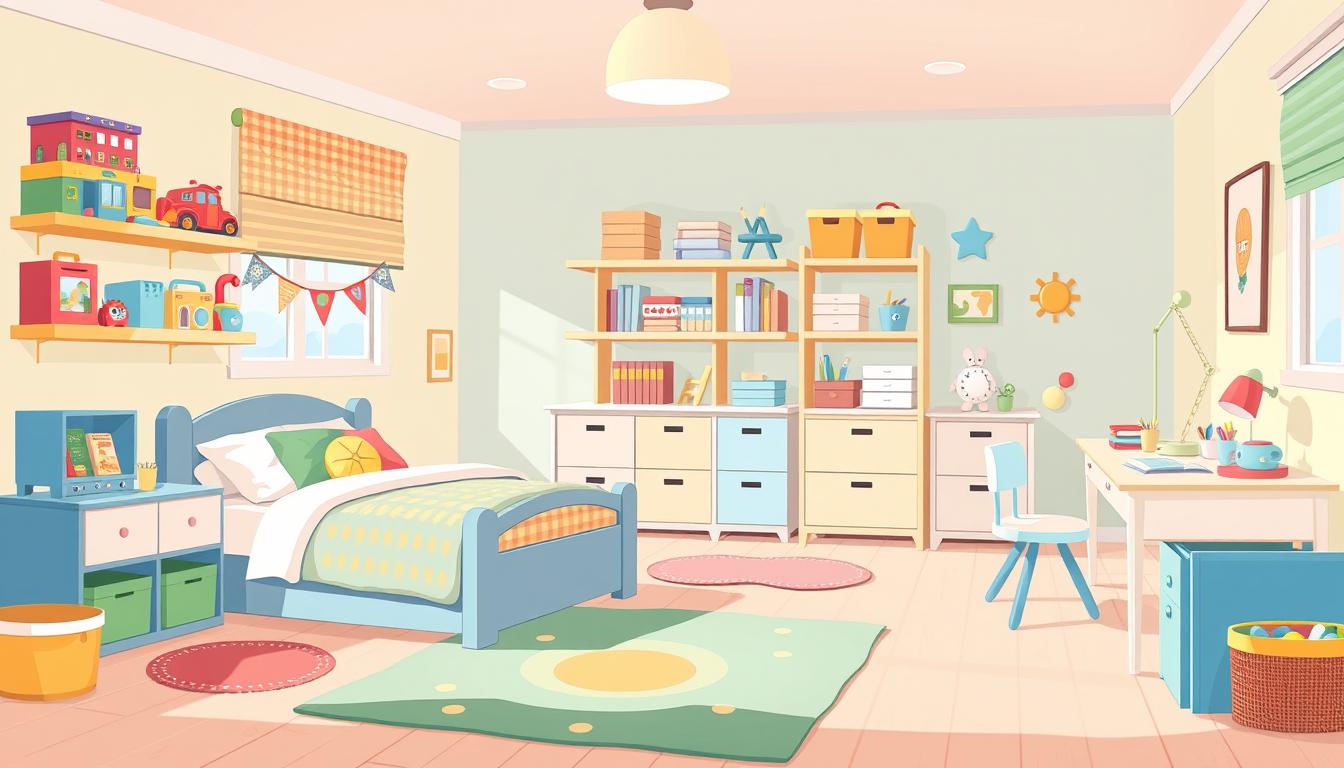Routines that Work: Helping Young Kids Thrive

As a parent, I’ve learned that setting up routines for young kids is key. It makes them feel safe and helps them grow. A routine gives kids a sense of control and predictability.
Realistic routines help kids learn self-regulation, mental health, and responsibility. They find comfort in knowing what to do each day. This comfort comes from clear, predictable daily structures.
Research shows kids do well with routines. They learn by doing things over and over, like eating and brushing teeth. Realistic routines make our lives less stressful and more organized.
A good routine helps parents start the day right. It sets a positive mood for everyone. This is why a well-planned toddler schedule is so important.
Understanding the value of routines is the first step for parents. In this article, we’ll look at how routines benefit kids. We’ll also share tips on creating a toddler schedule that fits your family.
Key Takeaways
- Realistic routines for young kids are essential for their development and well-being.
- A well-structured routine helps children feel safe and secure, and supports their physical, emotional, and cognitive growth.
- Consistent routines teach children necessary activities through repetition, fostering learning and self-regulation skills.
- A toddler schedule can help parents establish a morning routine that works for their family, reducing stress and creating a more organized environment.
- Realistic routines for young kids can help them develop mental health, responsibility, and a sense of control.
- By involving children in the creation of their routine, parents can increase their willingness to participate without resistance.
Why Realistic Routines for Young Kids Matter
As a parent, setting a daily routine for kids is key for their growth. A good daily routine gives kids a sense of safety and order. It helps their body, mind, and heart grow strong.
Adding chores to their routine helps kids feel responsible and independent. This is important for their development.
Studies show that a daily routine is good for kids. It helps them form healthy habits and feel less stressed. It also teaches them to manage their time and control their actions.
Some good things about a daily routine for kids include:
- Improved sleep habits
- Increased sense of security and stability
- Enhanced self-regulation skills
- Developed sense of responsibility and independence
By setting a realistic daily routine and adding chores, parents help their kids grow up happy and healthy.
| Age Group | Daily Routine Activities |
|---|---|
| Infants (0-12 months) | Feeding, sleeping, and playtime |
| Toddlers (1-3 years) | Meal times, play periods, and rest times |
| Preschoolers (4-5 years) | Age-appropriate chores, educational activities, and outdoor play |
Creating the Perfect Morning Routine
Starting a morning routine with kids can seem hard. But, with some planning and sticking to it, it gets easier. As a parent, I’ve found that a good morning routine sets a positive start for the day. It’s key to make it fun and engaging for kids.
A morning routine for toddlers should mix play, learning, and self-care. This helps them feel responsible and independent.
Some tips for a great morning routine include clear expectations and making it fun. Using visual aids like lists can also help. For example, setting alarms 15 minutes earlier can make mornings smoother. Implementing visual aids helps kids stay on track. Here are more tips:
- Wake up 15-30 minutes before your kids to establish a morning routine
- Use a morning routine chart with pictures for younger kids
- Make weekends special by maintaining a routine with special activities before usual tasks
A good morning routine changes your child’s day. It helps them feel responsible, independent, and disciplined. So, create a morning routine that fits your family. Watch your child do well. 
Consistency is key when it comes to establishing a morning routine. By sticking to a routine, you can help your child develop a sense of security and predictability, which is essential for their emotional and psychological well-being.
Essential Components of Daily Schedules
As a parent, making a daily schedule for your child is key. It helps them learn good habits and feel responsible. A bedtime routine for young children is very important. It helps them relax and sleep well.
When creating predictable schedule for kids, think about their age and needs. A daily schedule should mix activities like meals, play, and rest. Young kids need breaks and short play times. Older kids can handle longer activities.
Adding chores and errands to a child’s day teaches them responsibility. It also helps them learn life skills.
Some important parts of a daily schedule are:
- Meal time structure: Encourage healthy eating and social time during meals
- Play and learning periods: Set aside time for fun activities and learning
- Rest and quiet time: Make sure your child gets enough sleep and time to relax
Having a daily schedule helps your child feel secure and confident. It makes them more independent. But, be ready to change the schedule as your child grows.

| Age Group | Daily Schedule Components |
|---|---|
| Infants (0-12 months) | Feeding, sleeping, and playtime |
| Toddlers (1-3 years) | Meal times, play, and rest |
| Preschoolers (4-5 years) | Structured activities, outdoor play, and quiet time |
Building Effective Bedtime Rituals
As a parent, it’s key to have a bedtime routine for your child. This helps them sleep well. Reading a book before bed is a great parenting tip. It boosts school performance and sleep quality.
A bedtime routine helps kids sleep better and longer. It also makes moms happier. The routine should be 15 minutes to an hour, based on the child’s age.
Here are some parenting tips for a good bedtime routine:
- Establish a consistent sleep schedule
- Create a calming pre-sleep routine, such as reading a book or taking a warm bath
- Limit screen time before bed
- Make the bedroom a sleep-friendly environment
By using these parenting tips, your child will sleep better. A consistent bedtime routine is key for their success.
Studies show bedtime routines help kids sleep faster and longer. They also wake up less at night. By adding these parenting tips to your routine, your child will sleep better and be happier.
| Age Group | Ideal Bedtime Routine Duration |
|---|---|
| Infants | 15-30 minutes |
| Toddlers | 30-45 minutes |
| Preschoolers | 45-60 minutes |
Age-Appropriate Activities and Expectations
As a parent, it’s key to know the value of realistic routines for young kids. A good toddler schedule helps kids learn to control themselves, feel good mentally, and be responsible. For example, babies need tummy time every day. It helps them feel things and get stronger for moving around.
Studies show babies start smiling back by 2 months. This shows their brain is trying to talk back. As kids get older, they need different things. For instance, babies from 6 to 8 months like peek-a-boo and going for walks.
- Infants: tummy time, talking, singing, and laughing with them
- Toddlers: messy play with water, sand, and soft clay, and practicing simple dressing tasks
- Preschoolers: playing alone or with others, using crayons, safe scissors, paste or glue, and engaging in pretend play and group games
Adding these activities to a realistic routine for young kids helps them grow. It builds their feelings, social skills, and lays a strong base for the future. Try to limit screen time. Instead, encourage active play, socializing, and activities that fit their age.
Handling Routine Disruptions and Changes
As a parent, setting up a daily routine for children is key. It gives them a sense of order. But, when things change, it can be tough for kids. Travel, holidays, and being sick can mess up their routine.
To keep things stable, it’s important to stick to age-appropriate chores and routines. This helps kids feel secure, even when things change.
When things get disrupted, being flexible is important. You might need to adjust the daily routine for children to fit new schedules. This helps kids feel more in control, even when they’re in new places.
Adding age-appropriate chores to their routine helps kids feel responsible. It also makes them more independent.
To get back on track, start the routine again as soon as you can. Use a visual schedule or checklist to help kids stay on track. This gives them a sense of security and confidence, even when things change.
Here are some tips for dealing with routine changes:
- Warn kids about changes ahead of time
- Keep routines consistent when you can
- Give emotional support and reassurance
- Give rewards for good behavior
By using these tips and adding age-appropriate chores to the daily routine for children, parents can help kids handle changes better. This builds their skills and resilience.
Conclusion: Making Routines Work for Your Family
Creating a routine for young kids takes time and patience. But, it’s worth it. A predictable schedule makes kids feel safe and helps them learn good habits.
It also makes your family work better together. Finding the right mix of structure and flexibility is key. This way, you can adjust the routine when needed.
Letting your child help plan the routine makes them more willing to follow it. This builds teamwork and makes them feel more in charge.
Building routines is a journey, not a quick fix. Keep going, even when it’s hard. Trust that your family will find a good rhythm over time.
With a bit of creativity and lots of love, you can make morning and bedtime routines special. They will become a favorite part of your day.
RELATED POSTS
View all


